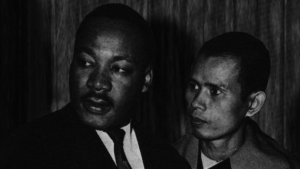January 2018
Thoughts from Annie
Celebration of Dr. Martin Luther King, Jr. Day and Thoughts on Skillful Means
So, if you’re seeking to develop a just society, they say, the important thing is to get there, and the means are really unimportant; any means will do so long as they get you there? they may be violent, they may be untruthful means; they may even be unjust means to a just end. There have been those who have argued this throughout history. But we will never have peace in the world until men everywhere recognize that ends are not cut off from means, because the means represent the ideal in the making, and the end in process, and ultimately you can’t reach good ends through evil means, because the means represent the seed and the end represents the tree.
— Dr. Martin Luther King, Jr., from A Christmas Sermon on Peace (1967)
 Dear Friends,
Dear Friends,
Right now, many of us may feel we want to join with Dr. King and his spiritual ancestors to take a stand against the injustices we are seeing the in the world today. If you’re like me, you may wonder, Am I using the kind of means that he spoke about?
There is a surprising Buddhist text on Skillful Means – the Upaya Kausalya Sutra – in which the Buddha, in one of his past lives, this one as a sea captain, was transporting 500 merchants. He discovers (in a dream) that one of the passengers is actually a robber, intent on killing all the rest and stealing their goods. The Buddha sea captain knows that if he does nothing many people die and the robber will suffer terrible karmic consequences. But, if if he tells the other merchants, they will kill the robber and they will suffer the karmic consequences. So “with great compassion and skill in means” he kills the robber. He himself takes the karmic consequences of the murder, but in the sutra it suggests that, although the killing brought about negative consequences for the Buddha, it was less so because the captain’s actions were done with sincere compassionate intentions. (Description of this sutra can be found in Peter Harvey’s book, An Introduction to Buddhist Ethics.)
Apart from the unlikely idea that one robber could kill 500 merchants, or that we should kill someone as a result of our dream images (this would not be a good practice for me), this sutra challenges our thinking about means and ends and how to determine whether our actions are beneficial. Will our actions lead to more awareness and more loving kindness, in the long run?
Clearly the means we use matter, but how can we learn whether we are practicing the kind of skillful means that Dr. King spoke about, and how can we gain confidence in making wise choices about how to act? What helps me most of all is listening to some of our greatest spiritual teachers. But doing so, I can begin to understand and approximate skillful means for myself.
Some of the wisdom I turn to to help me better understand skillful means
“With mindful walking, our steps are no longer a means to arrive at an end. When we walk to the kitchen to serve our meal, we don’t need to think, ‘I have to walk to the kitchen to get the food.’ With mindfulness, we can say, ‘I am enjoying walking to the kitchen,’ and each step is an end in itself. There is no distinction between means and ends. There is no way to happiness, happiness is the way. There is no way to enlightenment, enlightenment is the way.” — Thich Nhat Hanh from Reconciliation: Healing the Inner Child
“To me, all the work I do is built on a foundation of loving-kindness. Love illuminates matters. And when I write provocative social and cultural criticism that causes readers to stretch their minds, to think beyond set paradigms, I think of that work as love in action. While it may challenge, disturb and at times even frighten or enrage readers, love is always the place where I begin and end.” — bell hooks, interview with Thich Nhat Hanh
“So someone who carries a gun, such as a police officer or prison guard, can also be a bodhisattva. He or she may be very firm, but deep within there is the heart of a bodhisattva. Our task is to help prison guards and police officers, as well as prisoners and gang members, recognize and cultivate their bodhisattva nature.” — Thich Nhat Hanh, Peaceful Action, Open Heart: Lessons From the Lotus Sutra
“I think that this sense of meaning and purpose is really important in our lives, but I think at the same time there’s a Zen perspective that’s a little different. which is: you’re wholeheartedly in this moment, mindfully practicing not necessarily moving at snails place, there’s a kind of egolessness there. You don’t need as well to have meaning and purpose in one way, but in the other way meaning and purpose is important because you come from a place where what you’re doing is not selfishly oriented, but it’s really about benefitting others.” — Roshi Joan Halifax, on Synchronicity
“If I want to deprive you of your watch, I shall certainly have to fight for it; if I want to buy your watch, I shall have to pay for it; and if I want a gift, I shall have to plead for it; and, according to the means I employ, the watch is stolen property, my own property, or a donation. Thus we see three different results from three different means. Will you still say that the means do not matter?” ― Mahatma Gandhi, Non-Violent Resistance
“Anger has within it wisdom, and that wisdom is clear seeing.” — Roshi Joan Halifax, on Synchronicity
Questions to consider
How does skillful means manifest in your everyday life? Do you ever act out of the oft-heard quote, “the ends justify the means”? How are you skillful or unskillful in your own movement toward personal enlightenment? What about in your actions toward collective liberation? How do you know when you’re acting skillfully?
When have you sacrificed your presence, loving-kindness, or self-care in pursuit of righteous goals? Do you feel that was the best choice? What might you be willing to do in order for your candidate to win an election? Do your actions feel like skillful means?
with love,
annie.
